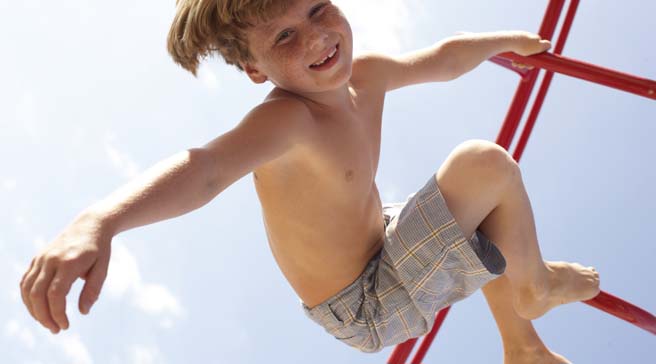Let your child make mistakes
Knowing when to step in and when to stay back can be tough, but it’s also one of the best parenting tools you have, says Sarah Neish

‘This morning, my son stuck a knife in a live toaster,’ says parenting expert and founder of maydaymums.co.uk, Karen Gardner. ‘He’s a bright 14-year- old, and yet somehow didn’t know that was dangerous.’
Watching our children make mistakes is painful, and this goes for electrocution as well as broken hearts. Whether they’re falling out with friends or off a climbing frame, our instinct is to protect our children. Yet they learn important lessons from making mistakes, and gain confidence when they spring back from them. An important part of emotional intelligence is knowing what to do after you’ve made a mistake.
‘Learning to control anger and frustration are the building blocks for coping in life,’ says Dr John Buckner from Harvard Medical School. We often stop children from making mistakes to save them feeling distressed.
But young children aren’t afraid of messing up. It’s only as we grow older and become socially conscious that we learn to associate blunders with shame. ‘Children only dread making mistakes as a result of their parents’ responses,’ says family psychologist Dr Randy Cale. ‘For example, if we show anger or disappointment.’ Most of us can recall a childhood telling-off where we felt desperately humiliated, and these are the times that led us to link failure with fear.
Try identifying experiences that made you feel anxious about getting things wrong, as this can help you to avoid creating the same worries for your own children. According to Cale, many parents jump in to correct their child’s mistakes, not realising that natural consequences do 90 per cent of the teaching for them. ‘There’s a strong tendency to feel shame present in children that you don’t need to accentuate,’ he says. ‘If you allow a child to process the emotions, you may not need to do or say anything else.’
Leaping in to correct mistakes can also be counter-productive. ‘Imagine a giant looking down at you with anger or upset in their eyes,’ says Cale. ‘If your child is wired in an oppositional way, you’ve just fired up their fight mechanism. They’re ready to dig their heels in.’
Further to this, research shows that negative feedback is mostly futile for children under 12. A study of eight- and nine-year-olds by psychologist Dr Eveline Crone revealed that the area of their brain responsible for cognitive control reacted strongly to positive feedback, but hardly at all to negative feedback. However, this changes at 12 years of age, when children start to pay attention to negative feedback as well.
In fact, there are only two mistakes that call for your input. First, if your child’s physical safety is under threat, and second, when the consequences of bad behaviour won’t be apparent for some time, for example if you hear your daughter lying to another child, but the effect of the lie won’t come out until next week. ‘If you spot your child doing something worrying but can’t see an instant repercussion, create one,’ says Cale. You could expose the fib with an apparently innocent question, to show your child you have noticed without shaming her.
How do you see the world? What’s your job as a parent? If you answered ‘To protect my child’ then your parenting style is likely to be fear-based. ‘Whenever a parent makes decisions based on trying to avoid something, they create anxiety for the child,’ says Cale. It can also lead to hyper-vigilance, with parents constantly reminding their child what to do. ‘Brush your teeth. Get out of the car. Pack your bag.’ This kind of prompting can unknowingly teach a competent, capable child to believe they can’t do anything unless told to.
If, on the other hand, you answered ‘To raise a child who’ll thrive in any situation’ then you believe he/she can learn from their mistakes. Children are more resilient than we think and are rarely scarred by early experiences. ‘They can’t grasp the gravity of situations like adults can and don’t dwell on things to the same extent,’ says paediatrician Dr Jennifer Cunningham.
Do you see your child as a miniature version of you, or as a one-of-a-kind individual? No matter how many of your qualities they’ve inherited, they are not destined to repeat your mistakes. One of the best gifts you can give your child is the independence to make their own decisions. ‘Many of us were managers before we were parents, so it can help to think of it as delegation,’ says Gardner. ‘When you delegate something, you don’t expect the other person to do it precisely as you would. So when you hand over decisions to your children, don’t expect them to make the choices you want them to.’
Ask, too, is it really a mistake? A child’s picture of success is different from yours, so be careful not to impose your values on them. ‘If they make an Airfix model and all the parts are attached in the wrong order, you may see mistakes but they see something they’re proud of,’ says Gardner. ‘Do these mistakes really need correcting?’
Letting your child make mistakes doesn’t just strengthen their resolve. It also builds your confidence. Through reassuring them that they can handle life, you begin to see it’s true – they can. ‘You want to instil in a child the sense that whatever life throws at them, they can handle it,’ says Cale. ‘The core of what we want to communicate to our kids is that they’re equipped and competent.’








